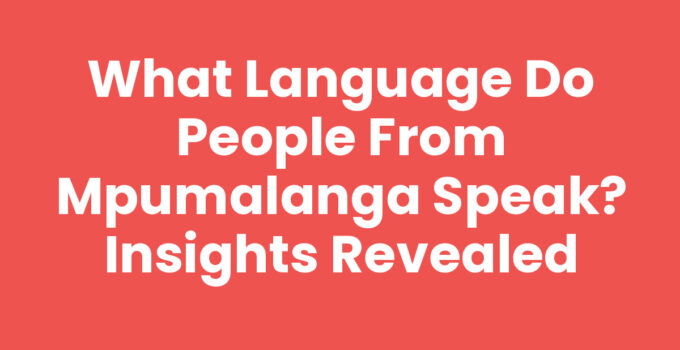Mpumalanga, a province in eastern South Africa, is renowned for its stunning landscapes, including the Blyde River Canyon and Kruger National Park. However, beyond its natural beauty lies a rich cultural tapestry, prominently defined by the languages spoken by its inhabitants. The purpose of this post is to explore the languages of Mpumalanga, providing insights into their origins and significance.
What Language Do People from Mpumalanga Speak?
The predominant languages spoken in Mpumalanga are isiNdebele, siSwati, and isiZulu. These languages reflect the heritage and traditions of the various communities that reside in the province.
1. isiNdebele: As one of the official languages of South Africa, isiNdebele is widely spoken in Mpumalanga. It is derived from the Nguni group of languages and has a rich history deeply intertwined with the Ndebele people, who are known for their vibrant artwork and beadwork. The language is characterized by its unique clicks and tonal qualities.
2. siSwati: This language is primarily spoken by the Swazi community in Mpumalanga. It shares similarities with isiZulu and is one of the official languages of Swaziland. The siSwati language not only serves as a communication tool but is also an essential part of cultural identity, embodying the traditions and customs of the Swazi people.
3. isiZulu: While isiZulu is predominantly spoken in KwaZulu-Natal, it has a significant presence in Mpumalanga due to migration patterns and cultural exchanges between the provinces. isiZulu is one of the most widely spoken languages in South Africa and is often used in schools and media within Mpumalanga.
In addition to these primary languages, English is commonly spoken, especially in urban areas, where it serves as a lingua franca among diverse communities. As South Africa is known for its linguistic diversity, Mpumalanga reflects this reality, with various other languages and dialects present due to migration and integration of different ethnic groups.
You Might Also Like: Finding Emergency Vets in Bloemfontein: What You Need to Know
The Cultural Importance of Language in Mpumalanga
The languages of Mpumalanga are not just means of communication; they are repositories of culture, history, and identity. Each language carries its own set of values, customs, and storytelling traditions that have been passed down through generations. For instance, isiNdebele is famous for its proverbs and idioms that convey wisdom and social norms.
Furthermore, language plays a critical role in fostering a sense of community. In rural areas of Mpumalanga, traditional gatherings and ceremonies often use indigenous languages, reinforcing the importance of culture and heritage while promoting social cohesion. The passing of oral traditions, folklore, and songs in local languages helps to preserve the unique identities of the various groups in the province.
Read Also: Is Bloemfontein the Same as Johannesburg? Discover the Truth
Challenges in Language Preservation
Despite the richness of linguistic diversity in Mpumalanga, there are significant challenges related to language preservation. Globalization and the increasing influence of English pose threats to local languages. Younger generations may favor English for economic opportunities, leading to a decline in the use of indigenous languages.
Efforts are underway to promote and preserve these languages. Educational initiatives aim to incorporate isiNdebele, siSwati, and isiZulu into school curricula, ensuring that children learn their mother tongues alongside English. Community programs and cultural festivals also celebrate local languages, encouraging their use and appreciation among younger audiences.
Ultimately, the future of language in Mpumalanga lies in striking a balance between embracing globalization and maintaining cultural integrity through local languages.
You Might Also Like: Exciting Day Trips from Bloemfontein for Every Traveler
Conclusion
Mpumalanga is a vibrant province where language serves as a crucial link between culture, identity, and community. With isiNdebele, siSwati, and isiZulu being the primary languages, understanding their significance offers deeper insights into the people’s history and traditions. As the province continues to evolve, prioritizing the preservation of these languages will be essential for maintaining the rich cultural mosaic that defines Mpumalanga.
Frequently Asked Questions
What are the main languages spoken in Mpumalanga?
The main languages spoken in Mpumalanga are isiNdebele, siSwati, and isiZulu.
Is English commonly spoken in Mpumalanga?
Yes, English is commonly spoken in urban areas and serves as a lingua franca among diverse communities.
What is the cultural importance of the languages in Mpumalanga?
The languages of Mpumalanga are crucial for preserving culture, identity, and tradition, serving as a means of communication and social cohesion.



